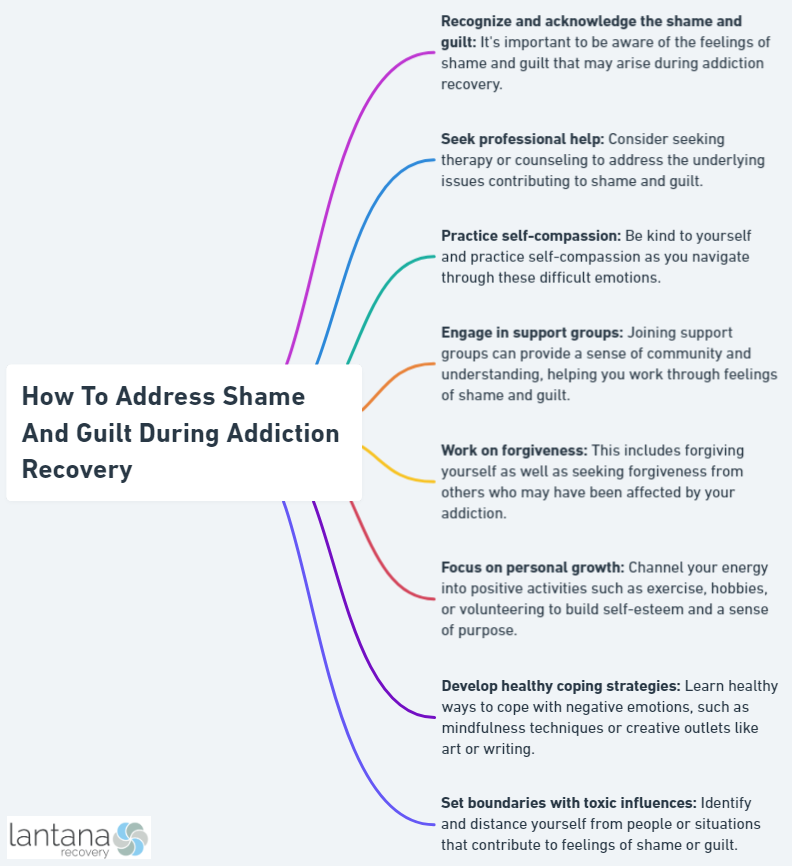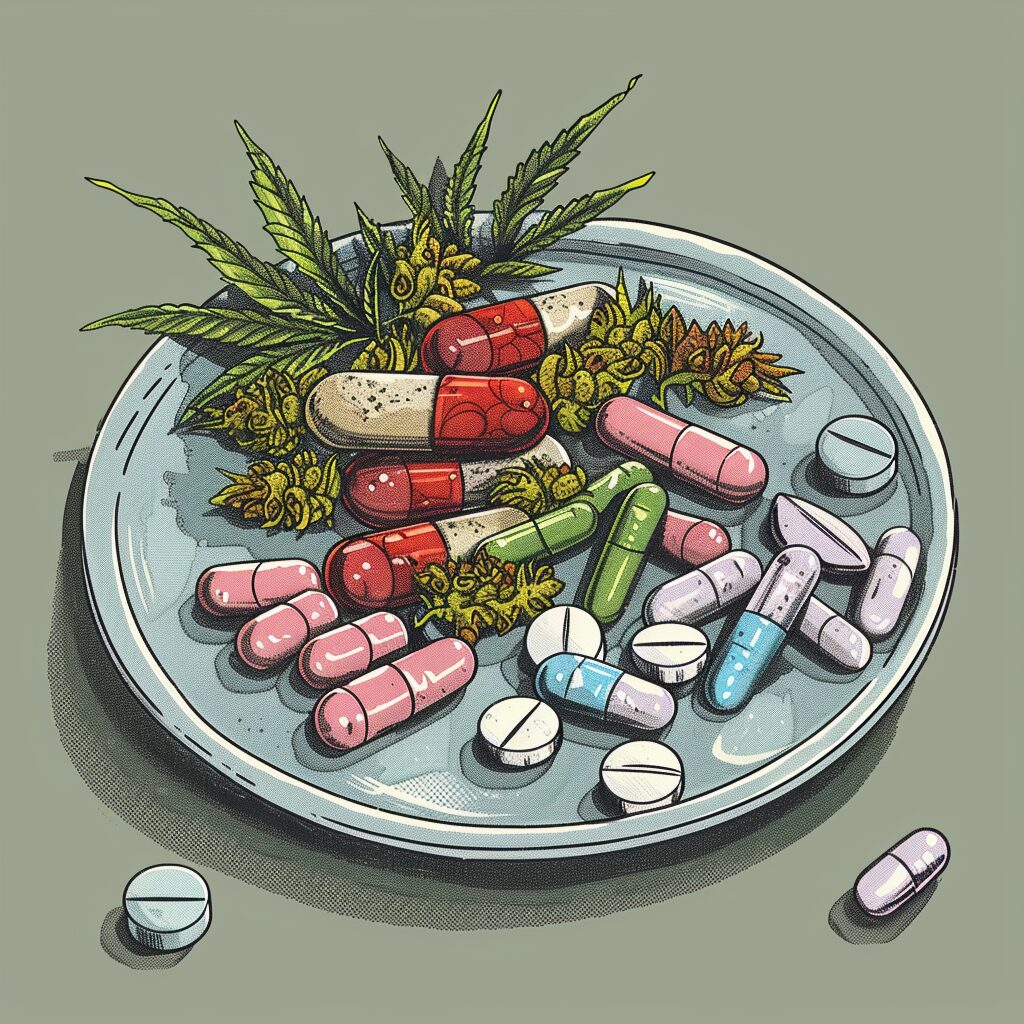Key Takeaway:
- Shame and guilt are powerful emotions that can play a role in addiction recovery. Understanding the difference between shame and guilt is crucial in addressing these emotions effectively.
- Effective coping strategies for shame and guilt include practicing self-compassion and self-care, developing a strong support system, and practicing forgiveness towards oneself.
- Professional treatment options for shame and guilt include Cognitive Behavioral Therapy (CBT), Dialectical Behavioral Therapy (DBT), and Acceptance and Commitment Therapy (ACT). Alternative therapies such as art therapy, mindfulness and meditation practices, and exercise can also be helpful in managing shame and guilt during addiction recovery.
Battling addiction can be a challenging journey and often comes with uncomfortable emotions such as shame and guilt. You don’t have to face this alone – this article will provide tools to help you process and heal from these difficult emotions. Take the step to start your recovery journey now!
Understanding and Addressing Shame and Guilt in Addiction Recovery
As someone who has gone through addiction recovery or knows someone who has, you may recognize the overwhelming and often consuming emotions of shame and guilt. These emotions can be barriers to healing and progress. In this next part, we will delve into the Understanding and Addressing Shame and Guilt in Addiction Recovery. We’ll explore The Role of Shame and Guilt in Addiction Recovery and the importance of Distinguishing Between Shame and Guilt. With real examples and expert research, we’ll highlight strategies that you can adapt to your own journey towards recovery.
The Role of Shame and Guilt in Addiction Recovery
Shame and guilt are commonly experienced emotions for individuals struggling with addiction. The role of shame and guilt in addiction recovery is critical, as it can be a significant obstacle to the person’s progress, impeding them from healing and making positive changes.
Shame often arises when an individual feels inadequate or unworthy, constantly reminding them of their mistakes or shortcomings. This emotion perpetuates destructive behaviors in individuals as they strive to numb these feelings through substance abuse. Guilt, on the other hand, is a more constructive emotion that occurs when an individual has violated their moral code. However, excessive guilt can become counterproductive and lead to self-blame and low self-esteem.
Understanding the role of shame and guilt in addiction recovery requires valuable information on how these emotions work. Shame keeps individuals stuck in cycles of addiction by eroding their sense of self-worth, pushing them towards further substance abuse to cope with negative feelings. Guilt can be useful in identifying harmful behavior patterns but becomes toxic when it prevents individuals from moving forward.
Overcoming shame and guilt is essential for successful addiction recovery, but it is not easy. A call-to-action to address shame and guilt entails accepting that these emotions are normal for someone living with addiction while committing to therapy or support groups where professionals or peers can help you build your confidence back.
As we move towards ‘Distinguishing between Shame and Guilt,’ consider how each emotion manifests differently within oneself so that one may identify triggers and work effectively towards long-term sobriety.

Distinguishing Between Shame and Guilt
Distinguishing Between Shame and Guilt is an important aspect of addiction recovery as these two emotions play a significant role in the behavior and self-esteem of an individual.
Shame and guilt are often used interchangeably, but they have distinct differences. While guilt is a feeling that arises from one s actions, shame is feeling bad about oneself as a person. Guilt motivates people to make amends for their mistakes and take corrective action, whereas shame causes individuals to feel worthless and undeserving of love or respect. Understanding these differences is crucial for those recovering from addiction as it can impact their progress towards sobriety.
Research suggests that shame-prone individuals are more likely to engage in addictive behaviors as a way to cope with their negative emotions. Shame can also hinder the recovery process by making individuals feel unworthy of help, leading to poor self-esteem and feelings of hopelessness. In contrast, guilt-prone individuals may be more successful in overcoming addiction, as they tend to take responsibility for their actions and seek ways to make amends.
It’s important to note that while shame can be damaging, it also has an evolutionary purpose. Feeling ashamed of immoral or unethical behavior helps us conform to social norms and maintain social order. However, this evolutionary mechanism can become problematic when it leads individuals to feel ashamed for seeking help or vulnerability.
Pro Tip: It’s essential not only to recognize the differences between shame and guilt but also to identify what triggers these emotions in you personally. Understanding your emotional triggers can help you develop better coping mechanisms and navigate difficult situations without turning towards addictive behaviors.
Keep reading if you want to learn some practical tips on effectively dealing with Shame and Guilt during addiction recovery!
Effective Coping Strategies for Shame and Guilt
As someone who has personally gone through addiction recovery, I know firsthand how shame and guilt can be major barriers towards progress. That’s why it’s crucial to have effective coping strategies to address these emotions. In this segment, I’m going to introduce three sub-sections that have helped me and many others on the road to recovery:
- Practicing self-compassion and self-care,
- Developing a strong support system, and
- Practicing forgiveness towards oneself.
All of these strategies have been thoroughly researched and have proven to be successful in helping individuals cope with shame and guilt during addiction recovery. So, let’s get started on how to implement these practices in your recovery journey.

Self-Compassion and Self-Care Practices
Self-Compassion and Self-Care Practices are essential tools that help individuals cope with shame and guilt during addiction recovery. These practices allow individuals to embrace self-love, kindness, and care while addressing negative emotions like shame and guilt.
Self-compassion involves treating oneself with understanding and care, just as one would treat a close friend who is suffering. It acknowledges that everyone makes mistakes and experiences difficulties in life. Self-care encompasses activities that people engage in to take care of their physical, emotional, and mental health wellbeing. Regular self-care practices can improve mood, well-being, reduce stress levels, and prevent burnout.
Self-compassion proves to be effective in combating negative self-talk; it equips the individual with the ability to handle negative emotions more flexibly than those who lack it. The practice boosts motivation, optimism, resilience in times of stress or failure. Engaging regularly in self-care activities helps prevent relapse during addiction recovery by helping one cope better with stressors and challenging emotions like shame and guilt.
Implementing Self-Compassion & Self-Care Practices can include:
- Setting aside time every day for meditation or practicing mindfulness by engaging in an activity mindfully.
- Talking positively to oneself when acting as their inner critic cancels out the negativity spiraling towards unrealistic expectations.
- Treat oneself with respect by establishing healthy boundaries between work-life balance engaging emotionally fulfilling activities during idle hours.
Remembering our struggles allow us to show Self-Compassion – reaching out for support from trusted individuals; acknowledging setbacks do not equate failure; being kind to oneself by nurturing recovery through seeking treatment or attending 12-step programs.
Moving forward Towards “Developing a Strong Support System,” understanding that Shame & Guilt are challenges bound to surface on this journey towards healing & sobriety – leaning towards forming positive relationships rather than avoiding them is crucial step forward.
Developing a Strong Support System
Developing a strong support system is crucial when it comes to coping with shame and guilt during addiction recovery. Having the right people around you can make a significant difference in your journey towards sobriety.
When you are surrounded by a supportive network of people, it becomes easier to share your struggles and receive empathy and encouragement in return. This sense of belongingness makes it easier for individuals to come out of their shells and break out of the cycle of self-blame and guilt that often accompanies addiction.
Furthermore, developing a strong support system offers multiple benefits such as providing emotional support, reducing stress levels, boosting self-esteem, and increasing accountability. It’s not surprising why people who have access to a solid support system are more likely to achieve their goals and maintain long-term recovery.
However, building a support system requires effort and patience. It would be best if you had friends or family members who understand your situation and genuinely care about seeing you succeed in your recovery journey. In addition, consider joining local support groups or seeking professional help from therapists or counselors if needed.
Pro Tip: One way to build a strong network is through regular meetings with like-minded recovery-focused individuals. These meetings can provide socialization opportunities while supporting each other’s recoveries.
Practicing Forgiveness Towards Oneself
Practicing Forgiveness Towards Oneself is a crucial aspect of addiction recovery that deserves attention. It involves exhibiting empathy, kindness, and compassion towards oneself despite past mistakes or shortcomings.
To practice forgiveness towards oneself, individuals can engage in different activities such as journaling, meditation, positive affirmations, seeking support from friends and family members, and embracing imperfections. Through these activities, people can release themselves from self-blame and the emotional burden that comes with it.
Often, individuals struggling with addiction feel shame and guilt for their actions in the past. However, it is essential to acknowledge that their actions do not define them entirely. Practicing self-forgiveness allows individuals to move beyond their past by acknowledging their mistakes without condemning themselves.
Forgiving oneself does not mean condoning wrongdoing but is rather about accepting responsibility for past actions while recognizing that one has the ability to make amends and grow from those experiences.
For those struggling with shame and guilt during addiction recovery, practicing self-forgiveness can aid in reducing negative emotions such as anxiety and depression while creating space for mental clarity and personal growth. Don’t let shame and guilt hold you back in addiction recovery; learn how to address suicidal thoughts in addiction recovery today to create a brighter tomorrow for yourself.
Ready to explore more effective coping strategies? Let’s dive into Professional Treatment Options for Shame and Guilt -because healing requires support beyond one’s own effort.
Professional Treatment Options for Shame and Guilt
Have you ever dealt with the overwhelming feelings of shame and guilt during addiction recovery? While these emotions can be challenging to navigate, there are several professional treatment options available that can help. In this discussion, we will explore three specific therapeutic approaches: Cognitive Behavioral Therapy (CBT), Dialectical Behavioral Therapy (DBT), and Acceptance and Commitment Therapy (ACT). Each of these approaches provides unique techniques for addressing shame and guilt during addiction recovery. So, let s dive in and learn how these professional treatment options can help with achieving lasting success in addiction recovery.

Cognitive Behavioral Therapy (CBT) for Shame and Guilt
Cognitive Behavioral Therapy (CBT) for Shame and Guilt is a widely recognized therapy approach used in addiction recovery to address feelings of guilt and shame. The CBT model proposes that thoughts, emotions, and behaviors are interconnected, and by changing one’s thinking patterns, emotional responses can be managed more appropriately.
In CBT sessions for shame and guilt, the therapist will work with the client to identify negative thought patterns and beliefs that contribute to their feelings of shame or guilt. Through cognitive restructuring techniques, the client is encouraged to challenge these automatic thoughts and replace them with more positive self-talk.
Furthermore, behavioral interventions such as exposure therapy may also be incorporated into CBT sessions. This involves gradually exposing the client to situations that trigger feelings of shame or guilt under the guidance of a therapist. Over time, the client develops new coping mechanisms and gains confidence in handling difficult emotions.
It is worth noting that while CBT can be effective for many individuals struggling with addiction-related shame or guilt, it is not a one-size-fits-all approach. Different individuals may respond better to different types of therapies depending on their unique circumstances.
Incorporating Cognitive Behavioral Therapy (CBT) for Shame and Guilt into your treatment plan can help you develop strategies to cope with this difficult emotion. With proper guidance from a qualified therapist trained in this method, it has potential to provide long-term relief from these intense emotions.
If you’re feeling overwhelmed by your own feelings of fear or missing out on valuable treatment opportunities because you haven’t explored all possible options, speak with a qualified professional about whether Cognitive Behavioral Therapy (CBT) may be right for you.
Ready for the next step? Check out our next section on Dialectical Behavioral Therapy (DBT) for Shame and Guilt – because no single method works best for everyone!
Dialectical Behavioral Therapy (DBT) for Shame and Guilt
Dialectical Behavioral Therapy (DBT) has emerged as a promising therapeutic approach for addressing shame and guilt in addiction recovery. This therapy combines cognitive-behavioral techniques with mindfulness to help clients manage emotions and develop coping skills.
In DBT, clients learn to identify and challenge negative self-talk that contributes to feelings of shame and guilt. They also learn how to tolerate distressing emotions without resorting to harmful behaviors. The focus of therapy is on helping clients build a life worth living, rather than fixating on past mistakes or shortcomings.
One unique aspect of DBT is that it emphasizes the dialectic between acceptance and change. Clients are encouraged to recognize that they can hold conflicting thoughts and feelings at the same time, such as accepting themselves despite their flaws while striving for self-improvement.
DBT for shame and guilt often involves group therapy sessions where clients practice applying DBT skills in role-plays and other experiential exercises. The therapist also provides individual coaching between sessions to support clients in using these skills in real-life situations.
Interestingly, DBT was initially developed by psychologist Marsha Linehan for treating individuals with borderline personality disorder who often struggle with intense feelings of shame and guilt. However, its effectiveness for addressing various mental health issues has led to its widespread use today.
I’m not sure about you, but I never thought I’d be learning about “dialectics” as part of addiction treatment! So what’s next? Well, let’s take a look at Acceptance and Commitment Therapy (ACT) for Shame and Guilt!
Acceptance and Commitment Therapy (ACT) for Shame and Guilt
Acceptance and Commitment Therapy (ACT) is a form of psychotherapy that has been found to be particularly effective in addressing feelings of shame and guilt during addiction recovery. Unlike some other therapies, which may focus more on uncovering the roots of these emotions, ACT is based on the principle that we cannot always control our thoughts and feelings, but we can control how we respond to them.
While some approaches to therapy involve cognitive restructuring or trying to change negative thought patterns, ACT is centered around mindfulness and the acceptance of thoughts and emotions without judgment. This can be particularly beneficial for those experiencing shame and guilt, as it allows them to acknowledge these feelings without becoming overwhelmed or mired in self-blame.
During an ACT session, a therapist may use various techniques to help their client identify their core values and set goals based on those values. Through mindfulness exercises, clients learn to notice when negative thoughts or emotions arise, but rather than fighting against them, they simply observe them with curiosity and without judgment. Over time, this practice can lead to increased emotional resilience and more positive relationship with oneself.
Research indicates that ACT can be especially helpful for individuals struggling with addiction who are also dealing with shame and guilt. Studies have found that participants who underwent ACT treatment reported greater improvement in both their emotional regulation and substance use outcomes compared to those who received other forms of therapy.
For those seeking support in managing feelings of shame or guilt during addiction recovery, Acceptance and Commitment Therapy (ACT) may be worth exploring further.
Don’t miss out on the potential benefits of ACT therapy for addressing shame and guilt during addiction recovery. By learning how to observe your thoughts without judgment and focusing on your core values instead of past mistakes, you could experience a greater sense of emotional resilience and wellbeing.
Ready for even more options when it comes to healing from shame and guilt? Check out our next section on alternative therapies for even more personalized solutions.
Alternative Therapies for Healing Shame and Guilt
In my addiction recovery journey, I’ve come across various therapeutic approaches to dealing with the emotional burdens of shame and guilt. One of the most effective methods for me has been alternative therapies. In this segment, I explore different alternative therapies for healing shame and guilt. We’ll examine the benefits of art therapy for coping with shame and guilt, the power of mindfulness and meditation practices in managing these emotions, and how yoga and exercise can help us work through these feelings. Research studies from reputable sources will back each of these methods.

Art Therapy for Coping with Shame and Guilt
Art Therapy for Coping with Shame and Guilt involves using creative activities like painting, drawing, sculpture, and other forms of art as a way of expressing emotions and coping with difficult feelings. This therapeutic approach can be an effective way to help individuals struggling with shame and guilt during addiction recovery.
The theory behind Art Therapy for Coping with Shame and Guilt is that the creative process allows for a non-verbal expression of emotions that may be too difficult or painful to express through words. By creating works of art, individuals can explore their inner selves and express repressed emotions in a safe and non-judgmental environment. Through this process, they can learn to identify negative beliefs about themselves that contribute to their feelings of shame or guilt.
Art therapy sessions may involve creating a piece of art that represents the person’s emotions or history. They can also do exercises where they paint or draw what they associate with shame or guilt. The therapist may then use these creations to guide discussions around the underlying causes of these negative emotions.
Art Therapy for Coping with Shame and Guilt is not just about providing an emotional outlet; it also helps individuals develop skills such as problem-solving, self-reflection, and self-awareness. These skills are essential for sustained addiction recovery because sufferers must learn how to confront challenging issues without relapsing.
If you’re struggling with shame or guilt in addiction recovery, Art Therapy for Coping with Shame and Guilt might be right for you. Don’t miss out on an opportunity to decrease your negative emotions by engaging your creative talents.
Next up: Embracing Mindfulness – A Practical Guide To Managing Your Shame And Guilt Without Letting It Define You!
Mindfulness and Meditation Practices for Shame and Guilt
As we delve into alternative therapies for healing shame and guilt during addiction recovery, it’s essential to understand the role that mindfulness and meditation practices play in addressing these emotions. Mindfulness has been defined as the practice of being present in each moment without judgment, allowing us to observe our thoughts and emotions from a stance of detachment.
Through mindfulness meditation, individuals can develop greater self-awareness and compassion towards themselves. They learn to embrace their feelings and experiences without judgment, while also developing the capacity to release negative thought patterns which may be contributing to their feelings of shame and guilt.
One reason why mindfulness meditation is so effective in addressing feelings of shame or guilt is because it helps individuals identify and confront their underlying triggers. Addiction often arises from an attempt to cope with shame, guilt or emotional pain. By developing greater awareness around these emotions through mindfulness practice, individuals are able to break free from these habitual patterns in a safe and controlled environment.
Mindfulness meditation can also be used as a tool for cultivating positive self-talk, which can help individuals foster a sense of self-esteem and worthiness. When used in conjunction with traditional therapy modalities like cognitive behavioral therapy (CBT), mindfulness meditation can help individuals work through deep-seated issues related to trauma or unresolved emotional pain.
As we reflect on the power of mindfulness as a tool for healing shame and guilt during addiction recovery, it’s worth noting that these practices have a rich cultural history dating back centuries. In fact, many ancient eastern philosophies tout the benefits of mindfulness meditation for promoting physical health, mental wellness and spiritual growth.
Moving forward into the next section of this article, readers will discover how yoga and exercise can also serve as valuable tools in managing feelings of shame or guilt without relying on addictive substances. So let’s stretch out those muscles together!
Yoga and Exercise as Tools for Managing Shame and Guilt
Managing shame and guilt during addiction recovery can be a challenging task. However, alternative therapies like Yoga and Exercise have proven to be useful tools in helping individuals cope with these emotions.
Yoga and exercise are both physical activities that can help release endorphins, which contribute to a feeling of happiness and wellbeing. These activities also provide a sense of accomplishment and achievement, which can help counter feelings of shame or guilt. Additionally, yoga incorporates mindfulness techniques, helping individuals better understand and manage their thoughts and emotions.
Furthermore, both Yoga and exercise create an opportunity for positive self-talk, replacing negative thought patterns with messages of strength, resilience, and positivity. With repeated practice, individuals may begin to see themselves in a different light through increased self-awareness.
Interestingly enough, these alternative therapies were not always considered legitimate treatments for managing shame and guilt. In fact, they were often overlooked as unproven methods of treating emotional distress in the past. However now we know that they play a valuable role in creating emotional balance.
As you go through your addiction recovery journey, it is essential to incorporate ongoing aftercare and maintenance as part of your overall approach to ensure long-term success. So why not make staying active fun; try Gymnastics classes!
Ongoing Aftercare and Maintenance in Addiction Recovery
When it comes to addiction recovery, the road can be long and challenging. However, it s not just about getting sober – it s about maintaining sobriety for the long haul. That s where ongoing aftercare and maintenance come into play.
In this part of the article, I ll be sharing some practical tips on how to maintain sobriety in the face of shame and guilt, so we can stay on track towards a healthier life. We ll explore several sub-sections, including:
- Developing a plan for relapse prevention
- Joining a 12-Step program for continued support
- Accessing additional forms of professional and peer support

Developing a Plan for Relapse Prevention
Developing a plan for relapse prevention is an essential step in addiction recovery. It involves creating a detailed plan to avoid the triggers that can lead to relapse, identifying potential risk factors and developing coping mechanisms to deal with them. While it may seem like a daunting task, developing a plan for relapse prevention can be incredibly effective at reducing the likelihood of relapse and promoting long-term sobriety.
The key to developing an effective plan for relapse prevention is to identify the individual’s unique triggers and risk factors. This can include things like stress, social situations, or specific places or people. Once these triggers have been identified, the individual can develop strategies for avoiding them and coping with them when they arise.
It’s important to note that developing a plan for relapse prevention isn’t just about avoiding triggers. It’s also about building a support system of friends, family members, and healthcare professionals who can provide ongoing support throughout the recovery process. This support system can play an essential role in helping individuals stay sober and cope with any challenges that arise.
While there are many resources available online for developing a plan for relapse prevention, it’s essential to seek professional help when going through addiction recovery. The guidance of experienced healthcare professionals can be invaluable in ensuring the success of long-term sobriety.
“I remember feeling overwhelmed when I first started my journey towards sobriety. Developing a plan for relapse prevention seemed like a monumental task that was impossible to achieve alone. However, with the help of my counselor, I was able to identify my unique triggers and develop strategies for avoiding them. Through hard work and perseverance, I’ve been able to maintain my sobriety over the years.”
Joining a 12-step program is another powerful tool that individuals in addiction recovery can use to promote long-term sobriety. These programs provide ongoing support from peers who have gone through similar experiences and share similar goals. With this kind of support, individuals in addiction recovery can continue to develop strategies for relapse prevention and maintain a strong support system throughout their journey towards long-term sobriety.
Joining a 12-Step Program for Continued Support
Social support has been found to be a crucial element of successful addiction recovery. Those struggling with addiction require the support of others who understand the challenges they are facing in order to stay motivated, focused and accountable. Joining a 12-Step Program for Continued Support can be an effective way to receive ongoing assistance throughout the recovery process.
- Research – Before joining any program, it is important to research and compare programs available in your area. Find what works best for you based on past experiences or preferences.
- Attend Meetings – Once you have identified a program that aligns with your values and beliefs, attend meetings regularly. The more frequently you attend, the more connected and supported you will feel, as well as increase your chances of experiencing long-term success in recovery.
- Engage – Active participation within the group by sharing experiences, emotions, and thoughts enables positive reinforcement from others members that often work wonders in bolstering one’s confidence.
Joining a 12-Step Program provides individuals with access to peers who have overcome similar struggles thus creating an empathetic environment providing comfort when needed. In addition to gaining accountability partners within such groups that significantly help sustain commitment towards recovery goals. These groups offer peer mentoring relationships where each member encourages and strengthens the other based on shared experience battling addictions.
A renowned example of joining a 12-step program would be Tony Mendez, former CIA officer got arrested for driving under the influence (DUI) after which he felt sincere regret about his drinking habits so attended Alcoholics Anonymous (AA). He was able to successfully quit alcoholism over time witnessing incredible changes such as self-awareness and new social surroundings helping him heal from guilt and shame associated with drinking habits.
Overall, joining a 12-Step Program can offer invaluable benefits when dealing with addiction recovery efforts through extensive network building providing members access enhanced social support systems, reinforced motivation levels towards sobriety.
Accessing Additional Forms of Professional and Peer Support.
In addiction recovery, accessing additional forms of professional and peer support is crucial for long-term success. These types of support can come in many different forms, such as therapy, mentorship, and support groups. They provide individuals with added resources and assistance that can help them overcome challenges they may face during their recovery journey.
Professional support is an invaluable tool for those in addiction recovery, as it allows individuals to receive specialized care from trained professionals who can provide a more structured and tailored approach to treatment. This type of support can take many different forms, including one-on-one therapy sessions or group counseling. It provides a safe space for individuals to talk about their experiences openly and get guidance on how to navigate the complex emotions and challenges that come with addiction recovery.
Peer support also plays an important role in addiction recovery by providing individuals with a sense of community, connection, and empathy. This type of support encourages individuals to share their experiences with others who have gone through similar struggles, offering a supportive environment where they can connect with people who understand what they are going through. Peer support groups like Alcoholics Anonymous or Narcotics Anonymous provide participants with regular meetings where they can share their experiences openly without fear of judgement.
It’s worth noting that accessing additional forms of professional and peer support does not mean that an individual’s existing network isn’t valuable. Rather, these additional sources of assistance add extra layers of safety nets that can improve the odds of success during the addiction recovery process.
Pro Tip: If you’re hesitant about accessing additional professional or peer support networks during your addiction recovery journey, remember that courage lies just beyond familiarity. While it may be uncomfortable at first to open up about your struggles or seek out new connections, doing so could help pave the way towards lasting change and success in your recovery journey.
Five Facts About How To Address Shame and Guilt During Addiction Recovery:
- Shame and guilt are common emotions experienced during addiction recovery. (Source: Verywell Mind)
- Ignoring or suppressing shame and guilt can hinder recovery progress. (Source: Psychology Today)
- Addressing shame and guilt requires acknowledging and accepting responsibility for past actions and behaviors. (Source: American Addiction Centers)
- Learning self-compassion and forgiveness can help alleviate shame and guilt. (Source: The Recovery Village)
- Support from a therapist, support group, or loved ones can aid in addressing shame and guilt during addiction recovery. (Source: Addiction Center)
FAQs about How to Address Shame And Guilt During Addiction Recovery
Q: What are some effective strategies to address shame and guilt during addiction recovery?
A: There are some effective strategies to address shame and guild during addiction recovery it can be useful in dealing with guilt and shame while recovering from addiction. They could include seeing a therapist or counselor, doing self-compassion exercises, practicing mindfulness, and meditating, joining a support group, and coming up with healthy ways to deal with bad feelings.
Q: Is it normal to feel shame and guilt during addiction recovery?
A: Yes, it is quite normal to feel shame and guilt during addiction recovery most common for people in recovery from addiction to feel ashamed and guilty. These feelings can be caused by a number of things, such as past actions that hurt or hurt others or oneself, the stigma that comes with addiction, or feelings of self-blame or failure.
Q: How can I learn to forgive myself during addiction recovery?
A: Learning to forgive yourself can be a challenging during addiction recovery, but the important part of addiction recovery. One strategy is to approach yourself with self-compassion and understand that everyone makes mistakes. It can also be helpful to work on making amends to those who have been hurt as a result of your addiction, as this can help to restore a sense of balance and alleviate feelings of guilt.
Q: What role do support groups play in addressing shame and guilt during addiction recovery?
A: The role of support groups can be a valuable players and resource for individuals in addiction recovery who are struggling with feelings of shame and guilt. Within these groups, individuals can share their experiences and provide support and encouragement to one another. This can help alleviate feelings of isolation and provide a sense of community.
Q: Can professional counseling help with addressing shame and guilt during addiction recovery?
A: Yes, professional counseling can be an effective strategy for addressing the complex emotions that may arise during addiction recovery, including shame and guilt. A trained therapist can help individuals to process and work through these emotions in a healthy and productive way, providing guidance and support as needed.
Q: How can I stay motivated to address shame and guilt during addiction recovery?
A: By staying motivated to address shame and guilt it can be a challenge during addiction recovery, but there are a few things that can help you stay on track and keep going. One important thing to do is to make goals that you can reach and celebrate each step along the way. Also, taking care of yourself, learning healthy ways to deal with stress, and finding a sense of purpose and meaning can all help you feel more motivated and committed to the recovery process.








